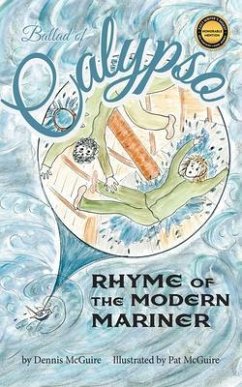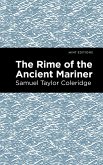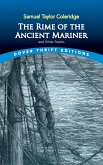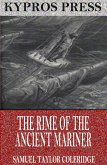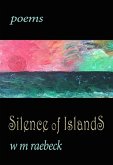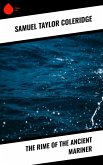"Calypso, Rhyme of the Modern Mariner" is a true story told in a fanciful fashion, employing "The Ballad of Calypso," a 445-quatrain ballad derived directly from Calypso's logbook. The prose, cartoon illustrations and photos which are woven into the ballad places the reader at the helm of a 26' wooden sailboat with a pair of newlyweds on their journey from Portsmouth, Rhode Island to Port Townsend, Washington.
The two-year endeavor begins with a successful commercial dive harvest of "herring roe on kelp" in Prince William Sound in the spring of 1979. Following the harvest and a cross country train ride to the east coast, the pair discover the "Newport Used Boat Show." There is an immediate attraction to Calypso when come upon at the show. The purchase is made, and her new "crew" move aboard in Portsmouth RI.
Calypso may be considered a primer on how to take a world class sailing voyage on the cheap. Many lessons will be learned as they are embedded in the story for discovery by the reader who will have a grip on the spokes of the wheel and throw sheets to the wind in perilous situations as they transit the Intracoastal Waterway to Florida. Bridges and ocean entrances provide a variety of obstacles to be overcome. They are plagued by a leaky vessel as well and an engine constantly breaking down.
Ultimately the engine is sold, Calypso is readied for a sail to the Bahamas when the crew learn of the "Mariel Boatlift." Plans change; they opt to sail for Cuba to make their fortune bringing refugees back to Florida. Becalmed, they meet and have lunch with Cuban fishermen. The following day they are sideswiped by a Cuban gunboat, boarded by the captain and first officer who ultimately expel Calypso and crew from the country.
The crew throws the "I-Ching" as a navigation tool which turns them west for Mexico. Two weeks later, they drop anchor at Isla Mujeres. The voyage continues down the Yucatan coast and after many challenges and much calamity, they arrive in Belize City, where Calypso is hauled into "Jones's Boatyard" for repairs.
In Honduras, Calypso rides out hurricane Hermine in the mangroves of Isla Utila. They make their way to Panama by sailing back north to Isla Mujeres from Roatan. Here the crew bring on Doug, their friend from Port Townsend and sail for Panama,1000 miles distant. They stop in Great Corn Island, Nicaragua which is recovering from the recent revolution and move on to Panama.
Calypso transits the Canal making a nefarious deal at a secret cove, one which will guarantee them a grubstake on their arrival up north. Leaving Panama, they sail into the Doldrums, make friends with a fish, drift 600 miles then are hit with a vicious storm force wind. Unbeknownst to the crew, they are attacked by teredos (naval shipworms). Calypso is sinking mid-pacific.
They buck the "Northeast Trades" taking on a boatload of blue-footed booby birds for a week. The I-Ching now turns them west for Hawaii, 3700 miles distant. She manages, after 97 days, to reach Hilo, where she makes repairs then ventures out into the North Pacific during the stormy month of September. If one finds the previous chapters remindful of Thor Hyerdahl's "Kon Tiki," then one may be reminded of Shackleton's James Caird on this leg of the journey.
Surviving the Equinox storms, she sails into the Strait of Juan de Fuca, completing her two-year voyage when she is run down by a freighter in the night.
The two-year endeavor begins with a successful commercial dive harvest of "herring roe on kelp" in Prince William Sound in the spring of 1979. Following the harvest and a cross country train ride to the east coast, the pair discover the "Newport Used Boat Show." There is an immediate attraction to Calypso when come upon at the show. The purchase is made, and her new "crew" move aboard in Portsmouth RI.
Calypso may be considered a primer on how to take a world class sailing voyage on the cheap. Many lessons will be learned as they are embedded in the story for discovery by the reader who will have a grip on the spokes of the wheel and throw sheets to the wind in perilous situations as they transit the Intracoastal Waterway to Florida. Bridges and ocean entrances provide a variety of obstacles to be overcome. They are plagued by a leaky vessel as well and an engine constantly breaking down.
Ultimately the engine is sold, Calypso is readied for a sail to the Bahamas when the crew learn of the "Mariel Boatlift." Plans change; they opt to sail for Cuba to make their fortune bringing refugees back to Florida. Becalmed, they meet and have lunch with Cuban fishermen. The following day they are sideswiped by a Cuban gunboat, boarded by the captain and first officer who ultimately expel Calypso and crew from the country.
The crew throws the "I-Ching" as a navigation tool which turns them west for Mexico. Two weeks later, they drop anchor at Isla Mujeres. The voyage continues down the Yucatan coast and after many challenges and much calamity, they arrive in Belize City, where Calypso is hauled into "Jones's Boatyard" for repairs.
In Honduras, Calypso rides out hurricane Hermine in the mangroves of Isla Utila. They make their way to Panama by sailing back north to Isla Mujeres from Roatan. Here the crew bring on Doug, their friend from Port Townsend and sail for Panama,1000 miles distant. They stop in Great Corn Island, Nicaragua which is recovering from the recent revolution and move on to Panama.
Calypso transits the Canal making a nefarious deal at a secret cove, one which will guarantee them a grubstake on their arrival up north. Leaving Panama, they sail into the Doldrums, make friends with a fish, drift 600 miles then are hit with a vicious storm force wind. Unbeknownst to the crew, they are attacked by teredos (naval shipworms). Calypso is sinking mid-pacific.
They buck the "Northeast Trades" taking on a boatload of blue-footed booby birds for a week. The I-Ching now turns them west for Hawaii, 3700 miles distant. She manages, after 97 days, to reach Hilo, where she makes repairs then ventures out into the North Pacific during the stormy month of September. If one finds the previous chapters remindful of Thor Hyerdahl's "Kon Tiki," then one may be reminded of Shackleton's James Caird on this leg of the journey.
Surviving the Equinox storms, she sails into the Strait of Juan de Fuca, completing her two-year voyage when she is run down by a freighter in the night.
Dieser Download kann aus rechtlichen Gründen nur mit Rechnungsadresse in A, D ausgeliefert werden.

